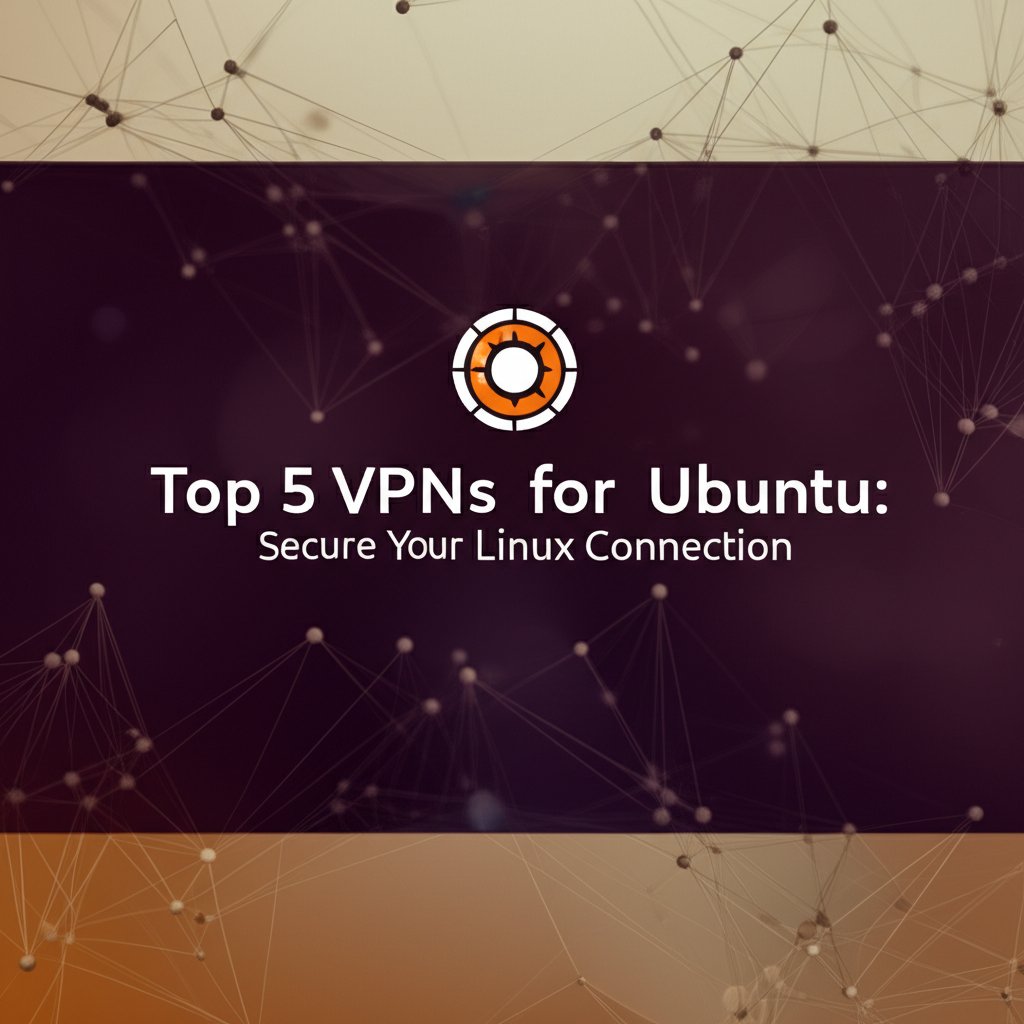Top 5 VPNs for Ubuntu: Secure Your Linux Connection
Ubuntu, a popular and powerful Linux distribution, is known for its stability, security features, and open-source nature. While Ubuntu provides a solid foundation for a secure computing environment, connecting to the internet always carries inherent risks. This is where a Virtual Private Network (VPN) becomes essential. A VPN encrypts your internet traffic, masks your IP address, and routes your connection through a server in a location of your choosing, significantly enhancing your online privacy and security.
For Ubuntu users, selecting a VPN isn't just about finding a service; it's about finding one that offers robust support and seamless integration with the Linux ecosystem. Many VPN providers prioritize Windows, macOS, and mobile platforms, leaving Linux users with limited options or requiring complex manual configurations. The best VPN for Ubuntu should offer a dedicated Linux client, ideally with a user-friendly interface (though command-line options are often preferred by Linux enthusiasts), strong encryption, a strict no-logs policy, and reliable performance.
Navigating the crowded VPN market to find the perfect fit for your Ubuntu system can be challenging. You need a service that not only provides top-tier security and privacy but also understands the nuances of Linux compatibility. Factors like ease of installation, available protocols (such as OpenVPN and WireGuard, which are well-supported on Linux), server network size, speed, and customer support are all critical considerations.
In this comprehensive guide, we review five of the leading VPN providers that stand out for their support and performance on Ubuntu. We've evaluated them based on their features, pros, cons, and suitability for different types of users, from those prioritizing maximum security and privacy to those seeking the best value or ease of use. Whether you're a seasoned Linux veteran or new to Ubuntu, finding the right VPN is a crucial step in protecting your digital life.
Understanding the Need for a VPN on Ubuntu
Even on a secure operating system like Ubuntu, a VPN serves several vital purposes:
- **Enhanced Privacy:** A VPN hides your real IP address, making it much harder for websites, advertisers, and even your Internet Service Provider (ISP) to track your online activities.
- **Improved Security:** By encrypting your internet connection, a VPN protects your data from being intercepted, especially when using public Wi-Fi networks. This is crucial for preventing man-in-the-middle attacks.
- **Bypassing Geo-Restrictions:** VPNs allow you to connect to servers in different countries, enabling access to content (like streaming services or websites) that might be restricted in your geographical location.
- **Secure File Sharing (Torrenting):** For users who engage in peer-to-peer file sharing, a VPN provides anonymity and protects against potential legal issues or monitoring.
- **Preventing Bandwidth Throttling:** Some ISPs may slow down your connection based on your online activity (like streaming or torrenting). A VPN can prevent this by masking your traffic type.
While Ubuntu's security model is robust, it doesn't inherently protect your data in transit across the internet from your ISP or other entities monitoring network traffic. A VPN adds that crucial layer of protection.
Top VPN Comparison for Ubuntu
When evaluating VPNs for Ubuntu, several key factors come into play: Linux compatibility (specifically for Ubuntu), security features, privacy policy (especially logging practices and jurisdiction), speed, server network size, and pricing. Here's a quick comparison of our top picks:
| Our rating (out of 5) | Starting price | Linux VPN app | Security | Privacy | |
|---|---|---|---|---|---|
| NordVPN | 4.7 | $3.39 a month for 10 devices. | Yes. | AES-256 encryption, multi-hop technology, obfuscated servers to prevent tracking, malware blocking. | Servers outside jurisdiction of surveillance alliances. No logs. |
| Surfshark | 4.6 | $1.99 a month for unlimited devices. | Yes. | AES-256 encryption, kill switch, IPv6 and DNS leak protection, AV, and malware blocking. | IP address swapping, no logs, operates outside of 14 Eyes. |
| CyberGhost | 4.3 | $2.19 per month per user. | Yes. | AES-256 encryption, kill switch, DNS leak protection, blocking of online tracking, NoSpy servers, ad blocking, AV. | No logs, operates outside 14 Eyes jurisdiction. |
| Proton VPN | 4.5 | $2.99 a month. | Yes. | AES-256 encryption, kills switch, ad-blocking, leak protection, password manager. | No logs, privacy focused apps, secure location outside 14 Eyes, blocks tracking. |
| WireGuard | 4.1 | Free. | Yes. | Cryptography features include Curve25519, ChaCha20, Poly1305, BLAKE2, SipHash24, HKDF. | Lacks privacy features. |
Let's delve deeper into each of these providers.
NordVPN: Best overall

Our rating: 4.7 out of 5
NordVPN consistently ranks among the top VPN providers globally, and its support for Linux, including Ubuntu, is a major reason why it's our top pick. It strikes an excellent balance between speed, security, privacy, and usability, even for Linux users who might be accustomed to more manual configurations.
Why NordVPN Excels for Ubuntu
While some VPNs might offer slightly better performance in specific niche areas, NordVPN's overall package is hard to beat. Its dedicated Linux application simplifies the installation and connection process significantly compared to manual OpenVPN setups. This app provides access to NordVPN's extensive feature set directly from the Ubuntu command line, offering a powerful and flexible experience for Linux users.
The provider boasts a massive network of servers spread across numerous countries, which is beneficial for both speed and accessing geo-restricted content. Their focus on security is evident in their use of strong encryption and advanced features like MultiHop (routing traffic through two VPN servers) and obfuscated servers (making VPN traffic look like regular internet traffic), which are particularly useful in restrictive environments.
Privacy is another cornerstone of NordVPN's offering. Based in Panama, outside the jurisdiction of the 5, 9, and 14 Eyes surveillance alliances, NordVPN maintains a strict no-logs policy, meaning they do not track or store your online activity. This policy has been independently audited, adding a layer of trust.
Although it might be slightly more expensive than some competitors, the comprehensive feature set, robust security, commitment to privacy, and dedicated Ubuntu support justify the cost for many users. The inclusion of their custom NordLynx protocol, built around WireGuard, often provides faster speeds than traditional protocols like OpenVPN, which is a significant advantage for bandwidth-intensive tasks.
For more detailed insights, you can refer to a full NordVPN review.
Pricing Tiers
NordVPN offers tiered pricing plans, typically with significant discounts for longer subscriptions:
- **Standard:** $3.39 per user a month (billed annually) for 10 devices. Includes the core VPN service with AES-256 encryption, access to their server network, and essential security features.
- **Plus:** $4.39 per user a month (billed annually) for 10 devices. Adds NordPass (password manager), NordLocker (encrypted cloud storage with 4GB initially), Threat Protection (anti-malware, ad blocker, tracker blocker), and a data breach scanner.
- **Complete:** $5.39 per month per user (billed annually). Includes everything in the Plus plan, plus 1 TB of encrypted cloud storage.
- **Ultimate:** $7.39 per month per user (billed annually). Includes everything in the Complete plan, plus dark web monitoring, credit monitoring, and cyber-extortion/identity theft insurance (availability may vary by region).
These prices are typically for the initial subscription term and may increase upon renewal. They also offer shorter-term plans (like monthly), but these are significantly more expensive per month.
Key Features for Ubuntu Users
- **Dedicated Linux App:** A native application specifically designed for Linux distributions, including Ubuntu, simplifying installation and management via the command line.
- **Protocol Support:** Supports OpenVPN (UDP/TCP) and its own NordLynx protocol (based on WireGuard), offering flexibility and performance options.
- **AES-256 Encryption:** Industry-standard strong encryption to secure your data.
- **Advanced Security:** Features like MultiHop (Double VPN), obfuscated servers, and a kill switch (essential for preventing data leaks if the VPN connection drops). Threat Protection Lite offers basic malware and ad blocking.
- **Vast Server Network:** Over 7,300 servers in 118 countries provides ample connection options for speed and geo-unblocking.
- **No-Logs Policy:** Independently audited policy ensuring your online activities are not recorded.
- **Fast Speeds:** NordLynx protocol is optimized for speed, providing a smooth experience on Ubuntu.
- **24/7 Support:** Live chat and email support are available around the clock.
- **Tutorials:** Comprehensive guides for installing and using the VPN on various Linux distributions.
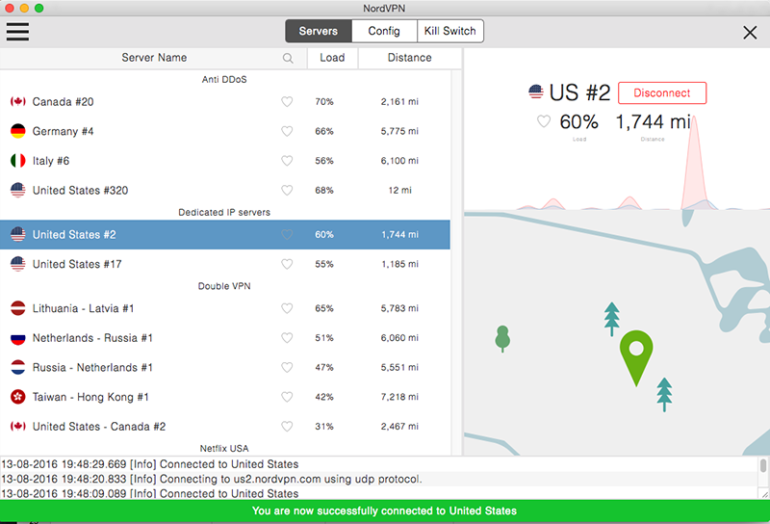
Pros and Cons
| Pros | Cons |
|---|---|
| Fast and secure connections, especially with NordLynx. | The primary Linux interface is command-line based, which might be less intuitive for users new to the terminal. |
| Large selection of servers around the world for speed and geo-unblocking. | It is one of the more expensive options on this list, particularly for shorter subscription terms. |
| Dedicated Linux app makes setup and use in Ubuntu relatively easy compared to manual configurations. | |
| Strong security features like MultiHop and obfuscated servers. | |
| Audited no-logs policy and privacy-friendly jurisdiction. |
NordVPN is an excellent choice for Ubuntu users who need a high-performance, secure, and private VPN service and are comfortable using a command-line interface for managing their connection.
Surfshark: Best for price-conscious users

Our rating: 4.6 out of 5
Surfshark stands out primarily for its exceptional value, offering a robust feature set at a very competitive price, especially for longer subscriptions. It's a strong contender for Ubuntu users who want excellent security and privacy without breaking the bank. Crucially, Surfshark supports unlimited simultaneous connections, making it ideal for individuals or families with multiple devices, including several Ubuntu machines or a mix of operating systems.
Why Surfshark is Great Value for Ubuntu
Surfshark provides a dedicated Linux app that supports Ubuntu, making installation and usage straightforward. Like NordVPN, its primary Linux interface is command-line based, offering control and flexibility. It supports essential protocols like OpenVPN and WireGuard, ensuring both compatibility and performance on Ubuntu.
Despite its low price, Surfshark doesn't compromise on security or privacy. It uses AES-256 encryption and includes a reliable kill switch to prevent data leaks. Features like CleanWeb (for blocking ads, trackers, and malware) and Bypasser (split tunneling) add further utility. For privacy, Surfshark is based in the Netherlands, outside the 14 Eyes alliance, and adheres to a strict no-logs policy, which has also undergone independent audits.
While its server network is smaller than NordVPN's, over 3,000 servers in 100 countries is still substantial and provides good coverage for speed and accessing global content. Performance is generally good, especially when using the WireGuard protocol, although speeds can occasionally be inconsistent depending on the server load and location.
The unlimited devices policy is a major selling point, allowing you to protect all your devices (Ubuntu desktops, laptops, phones, tablets, etc.) with a single subscription. This is a rare offering among premium VPN providers.
For a more detailed analysis, read the full Surfshark review.
Pricing Plans
Surfshark offers three main subscription tiers, with the lowest prices available on longer plans:
- **Starter:** $1.99 per user per month (billed biennially). Includes the core VPN features, unlimited devices, and basic ad/tracker/malware blocking (CleanWeb).
- **One:** $2.49 per user per month (billed biennially). Adds Antivirus, Alerts (data breach monitoring), and Search (private search engine).
- **One+:** $4.29 per user per month (billed biennially). Includes everything in the One plan, plus Incogni (service to automatically remove your data from company databases and search sites).
Monthly plans are significantly more expensive. Note that the heavily advertised low prices are typically for the initial 24-month period, and renewal prices may be higher.
Key Features for Ubuntu Users
- **Dedicated Linux App:** Command-line interface app for easy installation and management on Ubuntu.
- **Unlimited Devices:** Connect any number of devices simultaneously with one account.
- **Strong Security:** AES-256 encryption, kill switch, IPv6 and DNS leak protection.
- **CleanWeb:** Blocks ads, trackers, and malicious websites.
- **Bypasser:** Split tunneling feature to choose which apps or websites use the VPN.
- **Global Server Network:** Over 3,000 servers in 100 countries.
- **Privacy Focused:** Based outside 14 Eyes, audited no-logs policy, IP address rotation feature (Dynamic MultiHop).
- **Protocol Support:** Supports OpenVPN, WireGuard, and IKEv2.
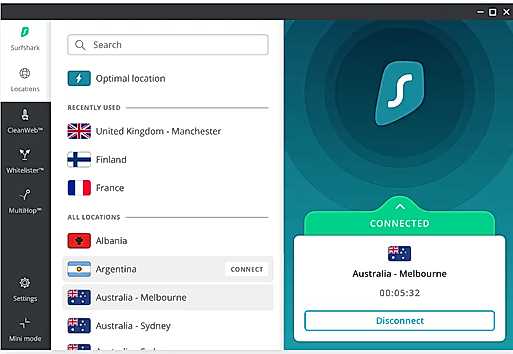
Pros and Cons
| Pros | Cons |
|---|---|
| Very affordable pricing, especially on long-term plans. | Speed can sometimes be inconsistent compared to top-tier competitors like NordVPN. |
| Unlimited simultaneous device connections. | Renewal prices can be significantly higher after the initial discounted period. |
| Operates outside the 5/9/14 Eyes surveillance alliances. | While it has a Linux app, it's primarily CLI-based, lacking a GUI for easier visual management. |
| Audited no-logs policy and strong privacy features like IP rotation. | |
| Dedicated Linux app (CLI) for Ubuntu. |
Surfshark is an excellent choice for Ubuntu users who need a budget-friendly VPN that doesn't skimp on core features, especially if they need to connect many devices simultaneously.
CyberGhost: Best for ease of use

Our rating: 4.3 out of 5
CyberGhost has built a reputation for being incredibly user-friendly across all its platforms, and its Linux offering is no exception. While its Linux client is also command-line based, the setup process and commands are designed to be intuitive, making it a good choice for Ubuntu users who might be less comfortable with complex terminal operations or those who are new to using VPNs on Linux. It offers a solid balance of features, performance, and price.
Why CyberGhost is User-Friendly for Ubuntu
CyberGhost provides a dedicated Linux client that simplifies the connection process. While it lacks a graphical interface on Linux, the CLI is well-documented and straightforward. The service is known for its categorized servers, with specific servers optimized for streaming, torrenting, or maximum privacy. This makes it easy for users to select a server based on their intended activity without needing to guess which server is best.
Based in Romania, outside the 14 Eyes alliance, CyberGhost maintains a strict no-logs policy, which is regularly published in transparency reports. Security features include AES-256 encryption, a kill switch, and DNS leak protection. They also offer unique features like NoSpy servers, which are owned and operated by CyberGhost itself, reducing reliance on third-party data centers and enhancing privacy.
CyberGhost boasts one of the largest server networks in the industry, with over 11,000 servers in 100 countries. This extensive network helps distribute load and provides numerous options for bypassing geo-restrictions and finding fast connections. While speeds are generally good, they might not consistently reach the peak performance of providers like NordVPN or WireGuard, but they are more than adequate for most daily tasks, including streaming and browsing.
The pricing is competitive, especially on longer plans, making it an accessible option for many Ubuntu users. The combination of ease of use (despite the CLI), a large server network, and strong privacy features makes CyberGhost a compelling choice.
Pricing Structure
CyberGhost's pricing is based on the subscription duration, with longer plans offering significant savings:
- $2.19 per month per user (billed biennially for a 2-year plan + 4 months free). This is their most popular and cost-effective plan.
- They also offer shorter plans (like 6 months or monthly) at higher per-month rates.
All plans typically include access to their full server network, 7 simultaneous device connections, and core VPN features.
Key Features for Ubuntu Users
- **Dedicated Linux Client:** Command-line application for Ubuntu with relatively easy setup and commands.
- **Categorized Servers:** Servers optimized for specific activities like streaming, torrenting, and gaming.
- **Massive Server Network:** Over 11,000 servers in 100 countries.
- **Strong Security:** AES-256 encryption, automatic kill switch, DNS and IPv6 leak protection.
- **NoSpy Servers:** Privately owned and operated servers for enhanced privacy.
- **Privacy Focused:** Based in Romania (outside 14 Eyes), strict no-logs policy with transparency reports.
- **Protocol Support:** Supports OpenVPN, WireGuard, and IKEv2.
- **Simultaneous Connections:** Allows up to 7 devices to connect concurrently.
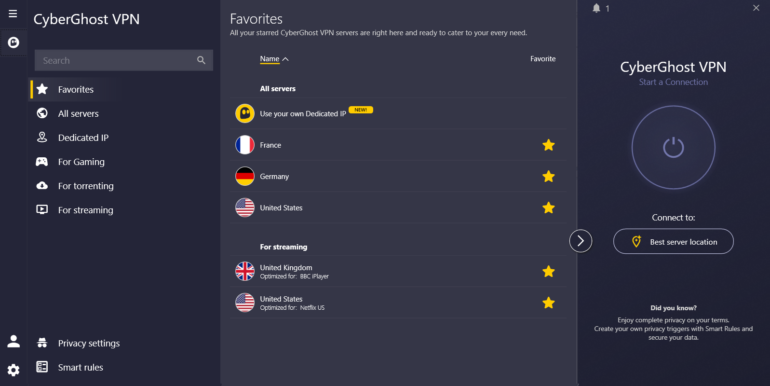
Pros and Cons
| Pros | Cons |
|---|---|
| User-friendly CLI for Ubuntu, making it easy to get started. | Speed can be inconsistent, though generally adequate for most tasks. |
| Very large server network with servers optimized for specific uses (streaming, torrenting). | Reported to be blocked in countries with heavy internet censorship like China. |
| Affordable pricing, especially on long-term plans. | While user-friendly for a CLI, it still lacks a native GUI for Ubuntu. |
| Strong privacy features, including NoSpy servers and an audited no-logs policy. | |
| Based outside the 14 Eyes jurisdiction. |
CyberGhost is a solid, reliable VPN for Ubuntu users who prioritize ease of use and access to a vast network of servers for various online activities, all at a competitive price.
Proton VPN: Best for Privacy

Our rating: 4.5 out of 5
Proton VPN, developed by the creators of the privacy-focused email service Proton Mail, places an unparalleled emphasis on user privacy and security. For Ubuntu users who prioritize keeping their online activities absolutely confidential, Proton VPN is a top contender. It offers a robust set of features designed to protect your data from surveillance and tracking.
Why Proton VPN is the Privacy Champion for Ubuntu
Proton VPN's commitment to privacy starts with its base in Switzerland, a country with strong privacy laws and outside the jurisdiction of the 14 Eyes surveillance alliances. Unlike many VPNs that rent servers, Proton VPN owns and operates its entire server network, giving them greater control over the infrastructure and reducing the risk of third-party interference. Their strict no-logs policy has been independently audited and is a core part of their service.
The provider offers a dedicated Linux application that integrates well with Ubuntu. This app supports essential protocols like OpenVPN and WireGuard and provides access to Proton VPN's unique privacy features, such as Secure Core. Secure Core routes your traffic through multiple servers, including hardened servers located in privacy-friendly countries like Switzerland and Iceland, before connecting to your final destination server. This multi-hop approach adds an extra layer of security against sophisticated network attacks.
Proton VPN also includes built-in ad, tracker, and malware blocking (NetShield) and a reliable kill switch. While their server network (over 12,000 servers in 117 countries) is extensive, speeds can sometimes be average compared to the absolute fastest providers, likely due to the extra routing involved in features like Secure Core. However, for users whose primary concern is privacy over raw speed, this is a worthwhile trade-off.
They also offer a free plan, which is a significant advantage for users who want to try the service or have basic VPN needs, although the free plan has limitations on speed, server locations, and device connections.
Pricing Options
Proton VPN offers several plans, including a free option:
- **Proton Free:** Free forever. Limited to 1 device, access to servers in 3 countries (US, NL, JP), and lower speeds. Good for basic browsing and testing.
- **Proton VPN Plus:** $4.99 a month (billed annually). Access to all servers in 117 countries, up to 10 devices, highest speeds, Secure Core, NetShield, P2P/Torrenting support, streaming support.
- **Proton Unlimited:** $12.99 a month (billed annually). Includes Proton VPN Plus features plus access to all Proton services (Proton Mail, Proton Drive, Proton Calendar, Proton Pass).
Monthly plans are more expensive. The Plus plan is the most popular for dedicated VPN users.
Key Features for Ubuntu Users
- **Dedicated Linux App:** Native application designed for Ubuntu, offering easy installation and management.
- **Extreme Privacy Focus:** Based in Switzerland, owns its server network, audited strict no-logs policy.
- **Secure Core:** Multi-hop routing through hardened servers in privacy-friendly countries.
- **NetShield:** Integrated ad, tracker, and malware blocker.
- **Strong Security:** AES-256 encryption, kill switch, DNS leak protection.
- **Large Server Network:** Over 12,000 servers in 117 countries.
- **Protocol Support:** Supports OpenVPN, WireGuard, and IKEv2.
- **Simultaneous Connections:** Up to 10 devices on paid plans.
- **Free Plan Available:** Limited but functional free tier.
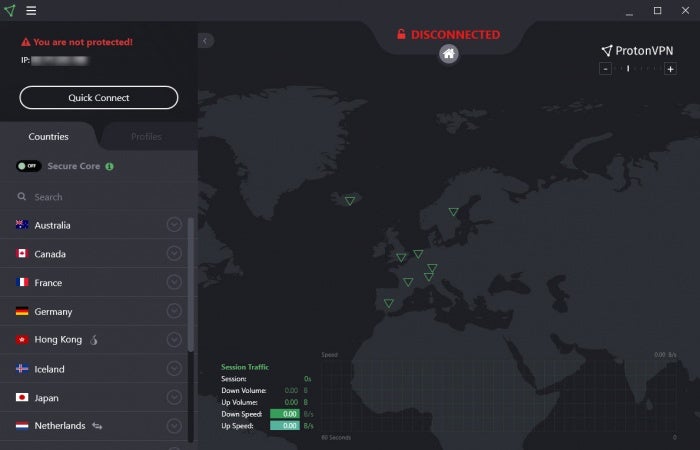
Pros and Cons
| Pros | Cons |
|---|---|
| Unparalleled focus on privacy and security, including Secure Core and owning server infrastructure. | Average speeds are decent but not as consistently fast as some competitors like NordVPN or pure WireGuard implementations. |
| Based in privacy-friendly Switzerland, outside 14 Eyes. | The free plan has significant limitations (speed, servers, devices). |
| Audited strict no-logs policy. | Reported to have difficulty working reliably in countries with strict internet censorship like China. |
| Dedicated native Linux app for Ubuntu. | Paid plans are slightly more expensive than budget options like Surfshark or CyberGhost. |
| Includes a functional free plan. |
Proton VPN is the ideal choice for Ubuntu users for whom privacy is the absolute highest priority, offering advanced features and a strong commitment to not logging user data.
WireGuard: Best for Linux purists
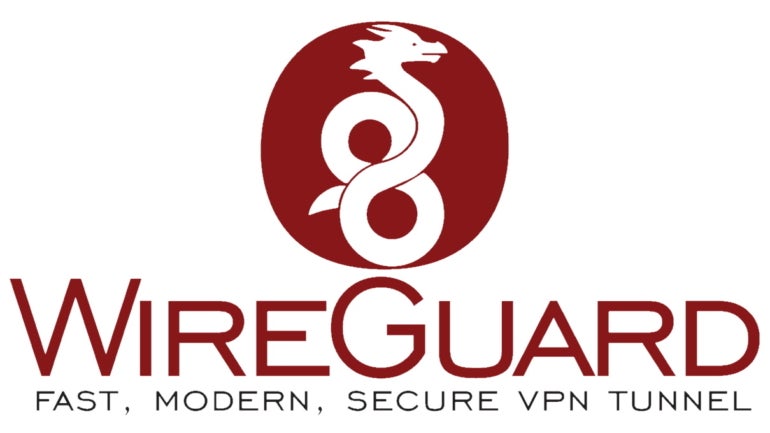
Our rating: 4.1 out of 5
WireGuard is fundamentally different from the other options on this list. It's not a commercial VPN *service* with a network of servers; rather, it's a modern, high-performance VPN *protocol* designed to be simpler, faster, and more efficient than older protocols like OpenVPN and IPSec. It's open-source and built into the Linux kernel, making it a natural fit for Ubuntu users who prefer a pure, minimalist, and highly configurable solution.
Why WireGuard Appeals to Linux Purists
For Ubuntu users who value control, transparency, and performance, setting up a VPN using the native WireGuard protocol is highly appealing. It's integrated directly into the Linux kernel, meaning it runs efficiently and requires minimal system resources. The codebase is significantly smaller than OpenVPN, making it easier to audit for security vulnerabilities.
Setting up WireGuard involves configuring tunnels between your Ubuntu machine and a server (which you would need to own or rent separately, or use a commercial VPN service that *supports* WireGuard as a protocol option). This requires a good understanding of networking and command-line configuration, which aligns with the DIY ethos of many Linux users.
WireGuard utilizes modern cryptographic primitives, contributing to its speed and security. It's designed for simplicity and high performance, often resulting in faster connection times and higher throughput compared to OpenVPN, especially on less powerful hardware.
However, it's crucial to understand that WireGuard *itself* does not provide the privacy features offered by commercial VPN services. It's a tunnel protocol. You are responsible for the server infrastructure, managing IP addresses, and implementing a no-logs policy. If you set up WireGuard between your Ubuntu machine and your own server, you know exactly what's happening. If you use a commercial VPN that offers WireGuard support (like NordVPN, Surfshark, or Proton VPN), you benefit from the protocol's performance while relying on the provider's server network and privacy policy.
Pricing
- **Free:** The WireGuard protocol software is open source and completely free to download and use.
Note that while the protocol is free, you will incur costs for the server you connect to, whether it's a rented VPS or part of a paid commercial VPN subscription.
Key Features for Ubuntu Users (Protocol Level)
- **Native Linux Integration:** Built into the Linux kernel for optimal performance and efficiency.
- **Lightweight and Fast:** Significantly smaller codebase and designed for high throughput and low latency.
- **Modern Cryptography:** Uses state-of-the-art encryption algorithms (Curve25519, ChaCha20, Poly1305, etc.).
- **Simple Design:** Easier to configure and audit compared to older protocols.
- **Open Source:** Fully transparent and auditable code.
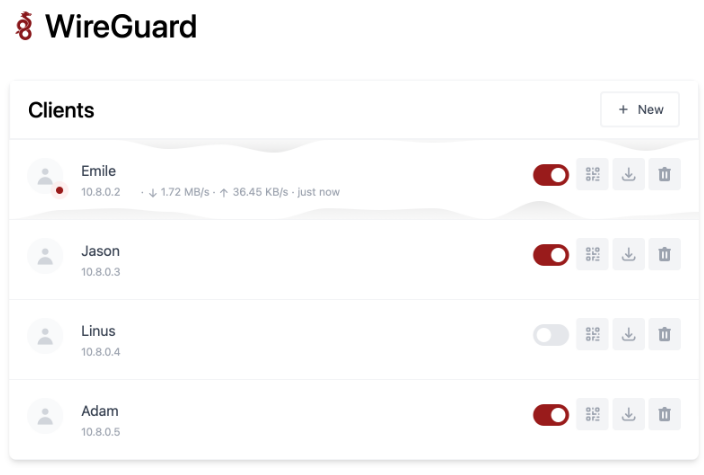
Pros and Cons (WireGuard Protocol)
| Pros | Cons |
|---|---|
| Free and open source. | WireGuard itself is a protocol, not a service; it lacks the infrastructure (server network) and built-in privacy features (like shared IPs, no-logs policy enforcement) of commercial VPNs. |
| Extremely lightweight and fast due to kernel integration and simple design. | Requires manual configuration and management, which can be complex for beginners. |
| Uses modern, strong cryptography. | Does not inherently provide privacy features like dynamic IP addresses or a guaranteed no-logs policy; these depend on the server setup or the commercial VPN provider using the protocol. |
| Easier to audit than older, more complex protocols. |
WireGuard as a protocol is excellent for Ubuntu users who want maximum performance and control and are comfortable with manual configuration. For most users seeking a simple, privacy-focused solution with a global server network, using a commercial VPN service that *supports* WireGuard (like NordVPN, Surfshark, or Proton VPN) is a more practical approach than setting up WireGuard independently.
How to Choose the Best VPN for Your Ubuntu Needs
Selecting the right VPN for your Ubuntu system depends heavily on your specific requirements and technical comfort level. Consider the following factors:
- **Linux Compatibility:** Ensure the VPN provider offers a dedicated Linux client that specifically supports Ubuntu. While manual OpenVPN configurations are possible, a native client simplifies installation, updates, and feature access. Check if the client is GUI-based or CLI-based, depending on your preference.
- **Security Features:** Look for strong encryption (AES-256 is standard), a reliable kill switch (essential!), and protection against DNS and IPv6 leaks. Features like multi-hop, obfuscated servers, and built-in malware/ad blockers add extra layers of security.
- **Privacy Policy:** A strict, audited no-logs policy is paramount. Research the provider's jurisdiction; being based outside the 14 Eyes alliance is generally preferred for privacy.
- **Protocols:** Support for modern, efficient protocols like WireGuard is a plus for speed and performance. OpenVPN remains a reliable and widely supported option.
- **Server Network:** A larger network of servers in many countries provides more options for speed, bypassing geo-restrictions, and finding less congested connections.
- **Speed and Performance:** While all VPNs introduce some overhead, the best ones minimize speed loss. Look for providers known for fast connections, especially if you plan on streaming or torrenting.
- **Ease of Use:** How easy is the client to install and use on Ubuntu? Is the documentation clear?
- **Customer Support:** Reliable support is important, especially if you encounter issues specific to the Linux client. Look for 24/7 live chat if possible.
- **Pricing and Value:** Compare pricing plans, considering the features offered, the number of simultaneous connections allowed, and the renewal costs.
Based on these considerations and our reviews:
- **NordVPN** is the top choice overall for its excellent balance of speed, security, privacy, and a robust (though CLI-based) Ubuntu client. It's ideal for users who need a high-performance, feature-rich VPN and are comfortable with the command line.
- Those wanting a good VPN at a more affordable price, especially if they need to connect many devices, should consider **Surfshark**. It offers a strong feature set and unlimited connections at a very competitive price point.
- Those desiring a reliable VPN that is relatively easy to set up and use on Ubuntu (for a CLI) and offers a massive server network with categorized options should try **CyberGhost**. It's a great all-rounder for users who prioritize simplicity and server variety.
- Those with an eye for maximum privacy and security are likely to be drawn to **Proton VPN**. Its Swiss base, owned infrastructure, Secure Core feature, and audited no-logs policy make it a leader in privacy, albeit potentially with slightly lower average speeds.
- Linux purists who want a lightweight, open-source solution and are comfortable with manual configuration, or who want to use the fastest possible protocol with a compatible commercial service, should look no further than **WireGuard** (either the protocol itself or a service supporting it).
Ultimately, the best VPN for your Ubuntu system is the one that best aligns with your specific needs for security, privacy, speed, and budget, while offering reliable support for the Ubuntu platform.
Methodology
To determine the best VPNs for Ubuntu in this guide, I conducted a thorough review process. This involved:
- **Feature Analysis:** Examining the core features offered by each VPN provider, with a specific focus on those relevant to Linux and Ubuntu users, such as dedicated Linux clients (CLI vs. GUI), supported protocols (OpenVPN, WireGuard), security features (encryption, kill switch, leak protection, advanced options), and privacy policies (logging, jurisdiction).
- **Linux Compatibility Assessment:** Investigating the ease of installation and use on Ubuntu. This included researching documentation, available installation methods (e.g., apt package, Snap), and the functionality of the Linux client.
- **Performance Evaluation:** Considering reported speed test results and general performance characteristics, particularly how well each VPN performs using protocols commonly used on Linux like WireGuard and OpenVPN.
- **Privacy and Security Audit:** Reviewing the provider's privacy policy, jurisdiction, and any independent audits of their no-logs policy or security infrastructure.
- **Value Proposition:** Comparing pricing plans, contract lengths, number of simultaneous connections, and money-back guarantees to assess the overall value offered by each service.
- **Expert and User Feedback:** Consulting existing expert reviews and user feedback specifically related to the performance and experience of using these VPNs on Linux/Ubuntu.
By synthesizing information from these areas, I was able to evaluate each candidate based on the key factors most important to Ubuntu users and provide recommendations tailored to different priorities, such as overall performance, budget, ease of use, or privacy.
